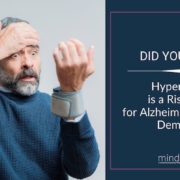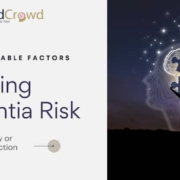Diabetes and Alzheimer’s: Is There a Connection?
What is the link between diabetes and Alzheimer’s dementia and how is this connection explained?
Is there a connection between diabetes and Alzheimer’s dementia? Research has shown that those living with diabetes are at greater risk for developing Alzheimer’s or vascular dementia. But why?
We know that diabetes is a risk factor for vascular dementia because this type of dementia happens when there is brain damage due to reduced or blocked blood flow to the brain. But, what is the connection between diabetes and Alzheimer’s disease?
Meredith Hay, Ph.D. Professor, Physiology in the University of Arizona Evelyn F. McKnight Brain Institute College of Medicine and biomedical researcher answers our questions.
What is the Link Between Diabetes and Alzheimer’s?
Diabetes is an inflammatory disease and we know that Alzheimer’s is also an inflammatory disease.
When you live with chronic levels of inflammation throughout your whole body, it affects your brain. That can increase your risk of cognitive impairment and dementia.

So, the two diseases are very, very closely linked, mainly due to that common denominator of chronic inflammation, a common background of diabetes and Alzheimer’s.
In diabetes that chronic inflammation harms the brain and accelerates the risk of Alzheimer’s.
There’s also a link between insulin and the brain. The brain is one of the organs with the highest energy needs in the body. It needs a lot of sugar to work.
If your insulin isn’t good and you can’t extract sugar from the foods you eat, then your brain may starve. And you may have cognitive impairment due to insulin insufficiency.
Does Low Insulin cause Dizziness or Woozy Moments?
There are a lot of reasons for that. And they are not directly related to Alzheimer’s. It is about that energy deficit and the impact on the brain in the long term.
These are long term effects or consequences of chronic inflammation and possible long-term effects of dysregulated insulin levels as well.
How is your memory today?
Find out by taking the MindCrowd memory test online. Help bring us closer to a cure for Alzheimer’s and other dementias.
What Percentage of Alzheimer’s Patients also have Diabetes?
According to an NIH study, 81% of Alzheimer’s disease patients have either Type 2 diabetes or impaired fasting glucose regulation (IFG).
What Develops First: Alzheimer’s or Diabetes?
Well, it’s a chicken and egg question. But typically diabetes comes first. Early onset diabetes or type 2 diabetes patients know that you live with that for years.
It’s a chronic disease and if not treated properly, it will increase your risk of Alzheimer’s. So, it’s not surprising to see such a high percentage of Alzheimer’s patients also having diabetes.
On the other hand, if you have Alzheimer’s you may not take care of yourself and develop diabetes.
One of the challenges of managing dementia patients is medication management. If a patient doesn’t have a caregiver, they may not remember to take their meds.
So, whether you have diabetes or high blood pressure (hypertension), you may be unable to manage your meds and your disease could progress to fatal levels.

Above-Normal Blood Sugar Levels: Are Diabetics more Likely to Get Alzheimer’s Dementia?
Yes, people with diabetes are more likely to get Alzheimer’s dementia. But it doesn’t mean they will develop mild cognitive impairment or dementia.
They have to manage their condition properly. But the risk factor is still there, managed or not.
Can Uncontrolled Diabetes Affect Memory?
In summary, yes. The inflammation caused by diabetes can affect cognition and memory as well.
Diabetes results in chronic levels of inflammation and dysregulation of insulin. As the disease progresses, the brain, exposed to decades of high inflammation and dysregulated insulin, is going to have decreased neural function and increased memory loss.
In terms of memory, it affects the hippocampus and the prefrontal cortex. Those are the main areas of the brain involved in memory per se.

Does Diabetes Cause Alzheimer’s?
No. Diabetes contributes to Alzheimer’s disease risk. It’s a risk factor.
Which Type of Diabetes Carries Increased Dementia Risk?
I don’t think we know the answer to that question. The question is always, do you have diabetes independently of type. And that can be linked to your cognitive function.
We do know about dysregulation of insulin (excessive insulin responses to sugars, fasting hyperinsulinaemia and insulin resistance). And it’s probably both types that carry increased risk for dementia.

Why is Alzheimer’s Sometimes Called Type 3 Diabetes?
Type 3 diabetes is a title proposed for Alzheimer’s disease that results from resistance to insulin in the brain. There is a variant of the APOE4 gene that seems to block the brain cell’s ability to use insulin. Source: Diabetes UK, and Mayo Clinic
So, it’s about insulin again. If the brain is the number one consumer of sugar, when you eat your meal and you ingest sugars, your brain consumes a lot of that sugar. And if your brain blocks the cell’s insulin’s absorption, your brain will be starved for sugar and not be able to function properly.

Is Alzheimer’s Diabetes of the Brain?
No, it isn’t. The corollaries between diabetes and Alzheimer’s are very close. There are a lot of different risk factors that go into Alzheimer’s other than the insulin component.
Does Sugar Make Dementia Worse?
Generally not. Sugar doesn’t make dementia worse. You can eat a piece of cake and it’s not going to increase your risk of dementia.
Chronic sugar, too much sugar does a lot of things. So, if you translate too much sugar into obesity, then yes, obesity makes dementia worse.
You could give a dementia patient a piece of cake. That’s not a problem. But you don’t want dementia patients to be obese or if you notice sundowners syndrome – changes in behavior in late afternoon or early evening – you may want to cut back on caffeine and sugars.
Link Between Diabetes and Alzheimer’s: Words of Advice
Diabetes is a manageable condition. Unlike genetic risk factors which you inherit from your parents, you can actually manage diabetes.
People should look at the relationship between obesity and diet because that contributes to diabetes, and thus, dementia.
Good eating habits, healthy foods, exercise, periodic doctor checkups and follow ups. You do what you have to do and even though you have the risk, you can lower it. There is hope.
FIND OUT MORE ABOUT YOUR BRAIN.
Discover how it compares with others like you in 10 short minutes by playing the free online MindCrowd memory game.
And help scientists find new ways to protect our brains from memory loss as we age.
Stay Tuned for News about Brain Aging and How to Avoid Cognitive Decline.
Meredith Hay, Ph.D. is an American academic and biomedical researcher. Meredith currently serves as Professor of Physiology Evelyn F. McKnight Brain Institute College of Medicine at University Arizona.









Leave a Reply
Want to join the discussion?Feel free to contribute!